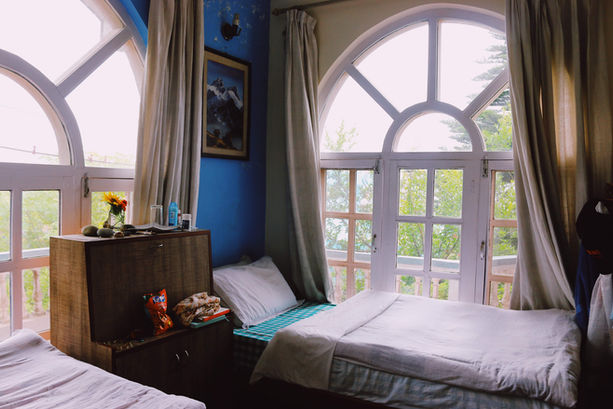
The Kevin Rohan Memorial Eco Foundation
Visit Us
Visit Us
Visit Us
The foundation has grown from humble beginnings to a flourishing center for eco-development. Renowned professionals from all over the world in fields ranging from biodynamic farming and medicine to architecture and education have come to lend their expertise. We also welcome the creativity and participation of interns and volunteers who would like to learn more about our projects. This generous national and international support has helped garner new perspectives and has encouraged positive change in keeping with our vision.
Since opening our doors in 2010, we have hosted volunteers, interns, and experts from nearly 50 countries around the world! You can become a part of our family by booking an experience that best fits your interests below!
Volunteer with Us
Volunteers stay from a range from a few days to many months and help in daily tasks, work on current projects and also take up their own initiatives. Volunteers work alongside local people doing various activities related to our goals and needs at any given time. Check out our Projects to see how you can make a positive impact on our community! Read the FAQ menu below for important information before you book your stay. To book your stay, please email us to let us know when you would like to visit and which program you are interested in volunteering with.
Intern with Us
Many students enrolled in universities across the world complete their independent internships at KRMEF. Students of all majors are welcome to intern here. In the past, majors have included agriculture, education, medicine, hospitality and tourism, religion, development, and computer science. Visit our University Study Abroad page to learn more about this program.
We are also looking for people committed to stay in Nepal for 5 months or longer to act as leaders of KRMEF’s projects. This program is for people who are enthusiastic and are looking to make a difference. It’s also a great opportunity to bring your own innovations to our projects! Below is a list of internship opportunities:
Volunteer Coordinator – KRMEF is home to a big family of international volunteers. We are looking for an intern to help everyone feel at home and to lead/delegate daily projects. Click here for more information and to apply.
Sustainable Development Coordinator – KRMEF continues to improve our existing sustainability initiatives and implement innovative new ideas. We are looking for interns with knowledge/experience in waste management, alternative energies or community development for this program. Click here for more information and to apply.
Technology & Media Coordinator – Daily IT management would be helpful for our administrative office and presence on various media platforms. Photography, videography, and social media skills for the purposes of marketing is also preferred in applicants. Click here for more information and to apply.
Fundraising Coordinator - KRMEF receives funding from multiple local and international sources, however we require someone with experience fundraising for nonprofits, including grant research and writing, implementing awareness campaigns, and international donor development, to assist our efforts. Click here for more information and to apply.
Architecture & Engineering Coordinator – One of KRMEF’s major initiatives is building structures that are eco-friendly and earthquake resistant. This internship position would allow you to help manage these projects. Click here for more information and to apply.
English Teacher - It is our goal that every local woman working at KRMEF has the ability to speak conversational English. This intern will teach the women employed by each of our programs (particularly in the Mahila Shakti Handicraft Workshop). Click here for more information and to apply.
Publicity & Marketing Coordinator – We need assistance in selling the products that help fund KRMEF, especially to new international markets. Applicants with social media and communication experience a plus. Click here for more information and to apply.
Handicraft Design Coordinator – The Mahila Shakti Handicraft Workshop creates jewelry and handicrafts made from local, sustainable materials. This intern would work with our craftswomen to create original jewelry and weaving designs which are Nepali inspired, but can be sold to markets around the world. Click here for more information and to apply.
Community Health Coordinator - This intern will support our medical clinic and implement strategies for greater community access to healthcare. Click here for more information and to apply.
Visit Us for the Day
We welcome all visitors staying in Kathmandu or elsewhere to check out all the exciting things happening here at KRMEF for the day! We recommend having a delicious Nepali lunch at Leela’s Eco Cafe, then tour our facilities or hike Champadevi Mountain, which, as we are located at the base of Champadevi, leads you through villages and beautiful ecosystems up to a Hindu temple and Buddhist monastery. Please let us know when you plan to visit so we can prepare accordingly.
Host a Meeting or Conference at KRMEF
Each year, we host a number of gatherings, including biodynamic conferences, psycho-social conferences, and community development meetings. Included in most meetings is lunch at Leela’s Eco Cafe. Please contact info@krmef.org to host your next conference or meeting in KRMEF’s dynamic event space!
We'll Help You Plan Your Stay
Our help desk can help you plan your stay in Nepal, including processing visas and airfare, and booking activities like rock climbing, rafting, hiking, village tours, vehicle rentals, jungle safaris, paragliding, and mountain flights.















